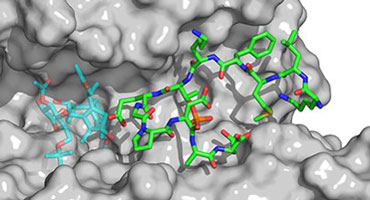Chemical biology
Bioactive molecules and chemical probes

Bioactive molecules and chemical probes are critical tools used to treat disease and study specific proteins within cellular environments. They act as essential aids in drug target validation, and provide complementary tools to molecular genetic approaches for the study of complex phenotypes. Chemical probes are readily functionalised with fluorophores, photoreactive groups, biotin, or bioorthogonal functional groups for in-cell labelling. Labelling strategies allow selective visualisation of proteins in cells, enabling quantification of enzyme activity, and identification of unknown protein binding partners via protein-protein interactions and potential ‘off-target’ protein interactions. In this way applications extend beyond questions related to phenotype, driven by research into selective protein-protein interaction modulators, heterobifunctional protein degraders, and cell permeable peptides. This is an exciting and rapidly developing field of research in which synthetic chemists and chemical biologists at Leicester are playing a leading role through targeted design and synthesis of new bioactive and probe molecules.